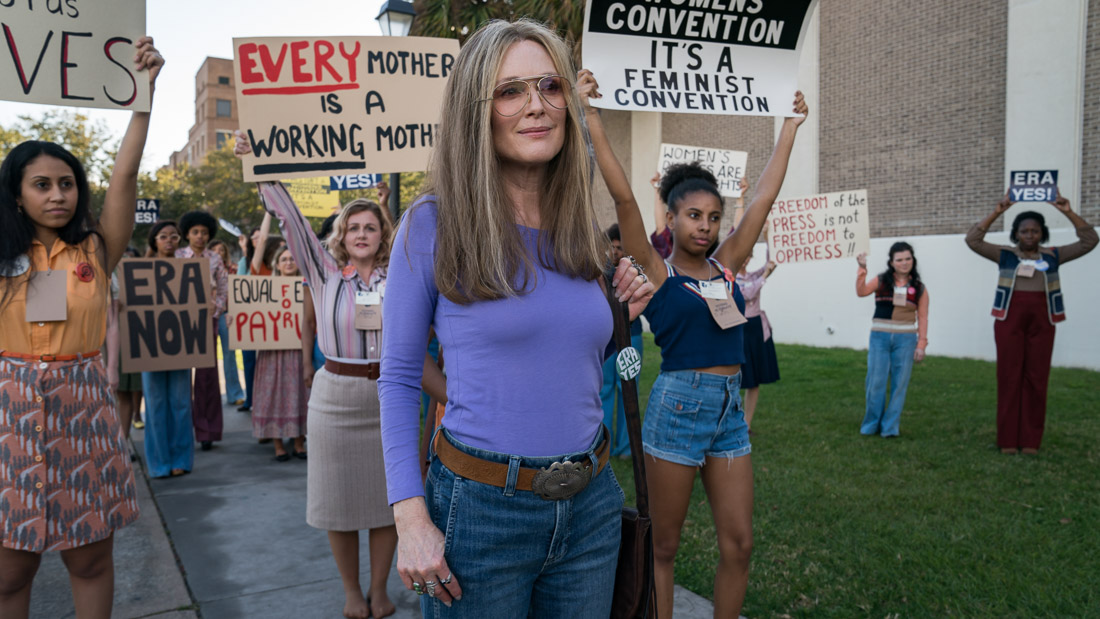Ace filmmaker Julie Taymor’s (‘Frida,’ ‘The Tempest’) eighth directorial venture. The Glorias’, follows the incredible journey of its protagonist, Gloria Steinem, through seven decades across two continents. The film has a non-linear narrative and simultaneously explores her childhood, teenage, youth, and middle age, portrayed by Ryan Kira Armstrong, Lulu Wilson, Alicia Vikander, and Julianne Moore, respectively. Also starring Bette Midler, Janelle Monáe, and Lorraine Toussaint, ‘The Glorias’ is also about second-wave feminism and how the protagonist becomes one of the most important leaders of the movement. If Gloria’s story has fascinated you enough to wonder whether it is based on true events, this is the article for you.
The Glorias: Adapting Gloria Steinem’s Life Story
Yes, ‘The Glorias’ is based on a true story. The film is the cinematic adaptation of the 2015 memoirs ‘My Life on the Road’ by feminist icon Gloria Steinem. The screenplay was written by Sarah Ruhl and Taymor. The film was produced by Page Fifty-Four Pictures in collaboration with Artemis Rising Foundation. Steinem is also depicted in the 2020 FX on Hulu TV series ‘Mr. America’, on which she is portrayed by Rose Bryne.
The film has some surreal and ambiguous scenes, including the ones involving all four Glorias traveling on a special Greyhound bus, meeting each other across space and time to share ideas and offer advice. However, it mostly concentrates on documenting her life: The time she spent with her traveling salesman father as a child, her choice of abortion in a country where it still hadn’t been legalized, her experience in India, her career as a journalist in New York City, and her emergence as one of the most influential figures in the second-wave feminism movement.
In a recent interview, Steinem spoke about the early period of her involvement in the movement. “We were supposed to have regular jobs, we were supposed to marry and have children,” she said. “And it wasn’t that I didn’t respect those things. I did, but … I was living in a different way. And until the women’s movement came along to tell me it was all right, I was rebelling but hoping no one would notice, if you know what I mean.”
According to Taymor, her film enunciates the importance of women helping other women. “I think women supporting women is critical,” she explained. “Our movie is a love story between women. And I don’t mean a sexual love story, I mean a passionate love story about women supporting women, getting out there, having ideals that they share. The men in Gloria’s life, there were lots of them, but I don’t concentrate on that.”
Gloria Steinem & Dorothy Pitman-Hughes' Restaging Of Iconic Portrait Shows Activism Has No Age https://t.co/51WVwY8nWt @HuffPost pic.twitter.com/XDHIAggGOu
— Bruce (@BruceBrothers) March 5, 2017
‘The Glorias’ challenges the widespread myth about second-wave feminism being a movement championed by white women. As Taymor stated, “It’s mistakenly thought that it was a white woman’s movement and it isn’t. And I think that this movie and Gloria’s life testifies to that.” The Tony-Award winner allocates significant screen time to the portrayals of women activists belonging to minority communities. One of Steinem’s closest friends and collaborators has been feminist, civil rights activist, and child welfare champion Dorothy Pitman Hughes (Janelle Monáe). They co-established the Ms. Magazine, the first liberal feminist magazine in the US. The inaugural issue, with its famous depiction of the Hindu goddess Kali as a modern woman holding a typewriter, skillet, rake, clock, telephone, mirror, steering wheel, and clothes iron in her eight hands, was published in December 1971. Since then, the magazine has been a voice for women and various groups of disenfranchised people. The now-quarterly magazine continues to be published even today.
The film also features Steinem’s interactions with Florynce Kennedy (Toussaint), Wilma Mankiller (Kimberly Guerrero), Dolores Huerta (Monica Sanchez), and Barbara Jordan (Margo Moorer). Kennedy was a renowned activist who was heavily involved in civil rights and feminist movements. Mankiller was a native American activist of Cherokee origin and had the distinction of being the first woman to be elected to the position of Principal Chief of the Cherokee Nation. Huerta is one of the most prominent labor leaders in recent US history. Along with Cesar Chavez, she set up the National Farmworkers Association (now United Farm Workers). Jordon was a lawyer turned politician. She was elected to the U.S. House of Representatives from Texas’ 18th district in January 1973 and served for one term until 1979.
This was an unprecedented feat, making her the first Southern woman of African American origin to accomplish this.
A considerable part of the film takes place on the road, an aspect of the memoirs that made Taymor interested in the project. She pointed out the general dearth of road movies about women, “You’ve got ‘Thelma & Louise,’ right? And they die. They die at the end. It doesn’t turn out well.” She later added, “Gloria says in her book, people mistakenly think that staying home is much safer for women. But she points out that the most dangerous place for many women is the home. … She came alive on the road, meeting other women, meeting other men. She’s able to cross gender, racial, and cultural lines like nobody I’ve ever seen.”
As for Steinem, she will be happy if the movie inspires others to publish their own stories. “… each of us has a story and we need to tell it. This is how we learn, this is how we teach, this is how we find a community. So, you know, I hope that the improbability and, in a way, the kind of ordinariness of my story and the stories within it … they will feel encouraged by something in the movie to tell their own story.”

